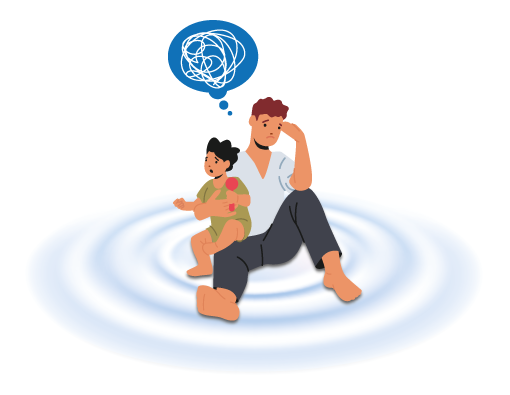December 2023
Adversity, Trauma & Resilience
In Wakefield we acknowledge that there is a profound link between adversity, trauma and resilience in the way that practitioners identify and assess risk. When supporting a child and their family through difficult times, it is important to correctly frame the language and terminology associated with adversity and trauma so we can communicate and connect with people through curiosity and compassionate understanding.
Understanding adverse childhood experiences can help professionals assess the potential effects of trauma on individuals and by following the approach of the 3 T’s, ‘Trauma Aware, Trauma Informed, Trauma Responsive,’ we are committed to building a stronger, more resilient community for this generation and the next.
This approach seeks to break the cycle of adversity and trauma by promoting resilience and well-being.
-
West Yorkshire Adversity, Trauma and Reslience (ATR) ProgrammeShow details
 The West Yorkshire wide ambition is to reduce trauma, adversity and build resilience for the population across West Yorkshire in particular people who are vulnerable, facing multiple difficulties, complex needs, adversity, and childhood trauma.
The West Yorkshire wide ambition is to reduce trauma, adversity and build resilience for the population across West Yorkshire in particular people who are vulnerable, facing multiple difficulties, complex needs, adversity, and childhood trauma.
This West Yorkshire wide (ATR) programme currently has over 600 members across the four networks including people with lived experience. The programme covers all sectors, organisations and everyone that lives and/or works in West Yorkshire and aims to:•Support individuals to make meaning out of trauma, move beyond trauma, and explore what a life after trauma could look like?
•Identify and prevent adversity and trauma as early as possible
•Prevent the re-traumatisation of people who are in services
•Identify the system changes and drivers we need to stimulate
•Identify the different things that need to happen at place and systems levels
Wakefield supports the West Yorkshire vision of working together with people with lived experience and colleagues across all sectors and organisations to ensure West Yorkshire is a trauma informed and responsive system by 2030 and develop a whole system approach to tackling multiple disadvantage.
Wakefield, as one of the five Places that will enable the vision to be realised, is committed and has elements of trauma-informed practice developing and, in some areas, is already well established. The work is diverse and has varied levels of maturity.
To find out more and access many resources from evidence based research to policies to videos, to podcasets and e-learning visit https://westyorkshiretraumainformed.co.uk
Adversity & the opportunity to build resilience
Adverse Childhood Experiences explained
We define adversity as situation/s or experience/s that a child finds very difficult, stressful, or challenging.
Adversity in childhood, sometimes known as ACEs, can be a single event or a prolonged threat to a child’s safety, security, trust or body integrity. This experience/s directly and significantly affects the child and their environment; they can therefore impact the way a child feels, behaves and views the outside world.
By putting the right services in place at the earliest opportunity we can buffer the impact of adversity and lessen the effects of its response, Trauma.
Early intervention and prevention offer an opportunity to protect the future for the next generation as well as creating a safe space to overcome difficulties which minimises the potential long term negative consequences.
To access the Risk and Resilience Training from Public Health visit our training page here

-
Show details
 What was the ACEs study? In 1995, an American study assessed the impact of Adverse Childhood Experiences. It studied the relationship between specific kinds of adversity that children faced in the home environment, abuse and neglect and household dysfunction.
What was the ACEs study? In 1995, an American study assessed the impact of Adverse Childhood Experiences. It studied the relationship between specific kinds of adversity that children faced in the home environment, abuse and neglect and household dysfunction.It looked at health risk behaviours such as smoking, suicide attempts, drug abuse and a high number of sexual partners as well as disease in adulthood such as cancer, heart disease, bronchitis etc. The study highlighted a significant relationship between the amount of Adverse Childhood Experiences experienced, the adult health risk behaviours and diseases experienced later in life. To find out more about the study click here. More recent research has included extra familial influences such as chronic poverty, violence in the community and racism for example.
-
Show details
 The evolution of the ACEs model The initial study had a narrow selection of contributing factors which did not take into account ecomonic disadvatage, discrimination and bullying for example but it is now well-known that these adversities also have a significant detrimental effect on a child. Neither did it consider protective factors and strength based work.
The evolution of the ACEs model The initial study had a narrow selection of contributing factors which did not take into account ecomonic disadvatage, discrimination and bullying for example but it is now well-known that these adversities also have a significant detrimental effect on a child. Neither did it consider protective factors and strength based work.There is still some work to be done to develop the model to include more positive factors in assessment of risk and therefore intervention. In Wakefield we, therefore try to take a more holistic approach which is both evidence-based, strengths-based and theraputic in nature.
-
Show details
 What are some common Adverse Childhood Experiences ? Common experiences can be:
What are some common Adverse Childhood Experiences ? Common experiences can be:· Abuse physical, emotional, sexual, neglect
· Violence or coercion in the home; being a member of a gang or victim of crime
· Adjustments migration, asylum, relationships, bereavement, natural disasters, pandemics
· Family Adversity substance or alcohol misuse, mental illness, criminal behaviour; destitution or deprivation, being a young carer.
· Inhumane treatment FGM, forced marriage, forced imprisonment -
Show details
 Why do Adverse Childhood Experiences matter? They can significantly alter the development and functioning of almost every system within the body. Early experiences of adversity can affect the development of cognitive skills, social skills and the ability to manage in relationships, emotional regulation and sensory process and regulation. As such, it is relevant to well-being and functioning in every aspect of life.
Why do Adverse Childhood Experiences matter? They can significantly alter the development and functioning of almost every system within the body. Early experiences of adversity can affect the development of cognitive skills, social skills and the ability to manage in relationships, emotional regulation and sensory process and regulation. As such, it is relevant to well-being and functioning in every aspect of life.The extent to which an individual may be impacted by experiences of adversity and trauma is dependent on factors such as: when it occurred, the frequency, who was the perpetrator (when considering abuse and neglect). The impact will be mitigated by protective factors such as the existence of other secure relationships and the social support within a young person’s life.
-
Show details
 How the stress response works The stress response of any individual can vary, for example, when faced with stressful or threatening situations a child will react naturally to the danger or percieved danger with a fight, flight or freeze response. The body will release stress hormones causing the pupils to dilate and the heart rate and blood pressure to increase.
How the stress response works The stress response of any individual can vary, for example, when faced with stressful or threatening situations a child will react naturally to the danger or percieved danger with a fight, flight or freeze response. The body will release stress hormones causing the pupils to dilate and the heart rate and blood pressure to increase.Toxic stress, or over stimulation of these responses can result in a child or adult being in a permanent state of stress. Without being able to return to a more natural relaxed state, navigating a healthy relationship can prove difficult due to the inability to think rationally. Read more about the brain and what happens when the amygdala is overactive.
Evidence shows that other long-term responses can include PTSD and attachment disorders but as no-one has the ability to determine why and when stress adaptation systems within a particular individual could be overwhelmed, we rely on probability and statistical analysis to help inform how we deal with Adverse Childhood Experiences.
Adverse Childhood Experiences can affect anyone at anytime regardless of their income and social level. Early intervention can reduce toxic stress and the long term impact.
-
Show details
 How can we reduce the effects? For those who have experiences Adverse Childhood Experiences there are a wide range of responses that can help to reduce its effect, such as, therapeutic sessions with mental health professionals, meditation, exercise and walking in nature.
How can we reduce the effects? For those who have experiences Adverse Childhood Experiences there are a wide range of responses that can help to reduce its effect, such as, therapeutic sessions with mental health professionals, meditation, exercise and walking in nature.Helping a child to build core life-skills will reduce the effects of toxic stress by providing
· Steady, consistent, positive adult relationships within the family and peers
· Problem solving skills and resilience
· Emotional regulation and literacy
· Access to a supportive wider community
· Compassionate and supportive professionals that are trauma aware, trauma informed and trauma responsive.
· Early intervention from support, therapeutic or safeguarding services
Adverse Childhood Experiences
from the perspective of one child who suffers from Domestic Abuse.
A short video to contextualise how they can affect an individual throughout their life.
Adverse Childhood Experiences Resources
TED Talk: How childhood trauma affects health across a lifetime; Adverse Childhood Experiences
Childhood trauma isn’t something you just get over as you grow up. Paediatrician Nadine Burke Harris explains that the repeated stress of abuse, neglect and parents struggling with mental health or substance abuse issues has real, tangible effects on the development of the brain.
Home office E-learning
Aimed at practitioners, professionals and volunteers who work with children, young people and their families, this e-learning is free to access and funded by the Home Office Early Intervention Fund. Certification provided.
The devastating impact of Trauma
Experiencing trauma can have a significant impact on a person's health and well-being. Trauma is a result from a one-off event or a series of circumstances that are harmful or life threatening and can be experienced at any time in life, even in utero.
Everyone's experience of a traumatic response is different but generally can have long-lasting adverse effects which limit the ability to function and achieve mental, physical, social, emotional, or spiritual well-being.
"Trauma refers to the way that some distressing events are so extreme or intense that they overwhelm a person’s ability to cope, resulting in lasting negative impact." UK Trauma Council

The 3 T's...

1. Trauma Aware
When helping a child and their family, it may feel difficult when faced with the effects of trauma. As practitioners, we must always remember to 'do no harm' and being 'trauma aware' becomes an essential element in our practice.
What is the Impact of Trauma?
The impact of a traumatic event/s can look and feel different for everyone but as trauma is experienced in the brain, the psychological response will vary from person to person. Brain development is often impaired and systems in the body become dysfunctional which can cause anything from hormonal imbalances, immune and nervous system problems and emotional and learning difficulties. Often trauma ripples out wider than the body, affecting family, the community, school life and social life; relationships are affected, as the fight, flight or freeze response in the brain can become hyperactive when perceived threat is detected, and this can be triggered much easier than someone who has not experienced and dealt with a trauma. When a child experiences trauma, they will try to protect themselves in a bid to feel safe.
Traumatic events such as; physical, sexual or emotional abuse, accidents, war, natural disasters, bereavement, divorce, fires, kidnap, bullying, violence or world-wide events such as pandemics, can leave a child traumatised and struggling to cope.
-
Show details
 Complex, Collective or Intergenerational Trauma Intergenerational trauma can last for many years, consider how Jewish Holocaust survivors and other members of the Jewish community have dealt with the atrocities of WW2 or the displacement of American Indians or enslavement, genocide and extreme poverty have affected many generations.
Complex, Collective or Intergenerational Trauma Intergenerational trauma can last for many years, consider how Jewish Holocaust survivors and other members of the Jewish community have dealt with the atrocities of WW2 or the displacement of American Indians or enslavement, genocide and extreme poverty have affected many generations.Trauma can become very complex and early intervention is key to healing trauma wounds. Read more about Trauma Informed Practice below.
2. Trauma Informed
Building resilience & Trauma informed practice (TIP)
The purpose of trauma-informed practice is to address the barriers that people face when affected by trauma, in particular when accessing health and care services. Trauma informed approaches are used to reduce the negative impact of trauma experiences and supporting mental and physical health outcomes.
Those working or volunteering with children and their families are not expected to ‘treat’ the trauma as a response, this is the role of a trauma-specialised service and we have many here in Wakefield. Instead, we become curious about a behaviour and create a safe space for healing.
There are 6 principles that are core to TIP: safety; trust, collaboration, choice, empowerment and cultural humility. TIP is a strengths-based approach looking to understand and respond to the impact of trauma on people’s lives to break intergenerational trauma and to support those going through the process now.
4 R’s that define a relational approach which is embedded in trauma informed practice:
- Realise that trauma has a widespread impact on individuals, families, groups, organisations, and communities and understanding paths to recovery
- Recognise the signs and symptoms of trauma
- Respond by integrating trauma knowledge into policies, and practices
- Resist re-traumatisation
-
Show details
 The working definition of 'Trauma Informed Practice'
The working definition of 'Trauma Informed Practice'
-
Show details
 Trauma behaviours Substance misuse
Trauma behaviours Substance misuse
Self harm
Suicidal ideation
Anger management issues
Can lead to ADD / ADHD / OCD
Risky or harmful behaviours
Insomnia
Detachment
-
Show details
 Trauma risks for adolescents and adults Homelessness
Trauma risks for adolescents and adults Homelessness
Being in an abusive relationship as either victim or perpatrator
Perpetuating the cycle of trauma generationally through not healing / understanding effects of trauma (see ACE's)
Being in the criminal justice system
Physical health symptoms such as asthma, coronary heart disease, diabetes and stroke
Mental ill health such anxiety, low self esteem, psychosis, PTSD, depression etc

3. Trauma Responsive
Without the right support, trauma can have enduring negative effects. Where possible, the team around the person should identify a practitioner who can take the lead and develop a relationship based on trust and honesty.
Practitioners should be compassionate and curious to offer flexible and creative solutions that promote engagement. Being professionally curious, empathetic and tenacious is essential when working around trauma as it may take a long time to develop a healthy, trusting relationship.
Remember
A trauma response can lead to fight, flight or freeze, which should not be mistaken for disengagement. When policies and practices are not trauma informed, we can inadvertently reinforce and retraumatise an individual, for example excluding a child from school can reinforce adversity from abandonment or rejection which can compound the effect and mirror the trauma.
Masterclass one 2023
Trauma: a lifespan perspective pt 1
Part 1 covers the consideration of early developmental trauma from Education Psychology, and how the Future in Minds, CAMHS team are responding to and supporting the workforce.
Masterclass two 2023
Trauma: a lifespan perspective pt 2
Part 2 two takes a deeper dive into vulnerable groups from the Youth Justice Service and Emotional Wellbeing team with recent case studies, models and techniques as well as how to build a self-aware and resilient workforce.
Take a look at the 2023 evaluation report for the Trauma: A Lifespan Perspective masterclass
Trauma and the Brain
A general introduction to what happens in the brain after children face traumatic experiences in childhood, like abuse and neglect.
This animation was developed by Professor Eamon McCrory and is a part of the Childhood Trauma and the Brain resource. Learn more about the science and how to apply it to practice on the UK Trauma Council website:
Trauma Resources
Child Trauma: Repl’ACE’ing the context by Cath Knibbs
What is Child Trauma? What is an ACE? Are they the same? 60 mins
- How does this impact a child’s development and their family?
- How does childhood trauma affect a parents ability to parent?
- How can professionals spot this, what are the signs to look for?
- How can professionals work with the child and familiy?
- How can professionals become trauma aware, informed, and then applied?
Poly Vagal motorway of wellness by Cath Knibbs
Catherine specializes in Cyber trauma and Child Sexual Abuse and Child Sexual Exploitation.
This video simplifies how our brain and body works together and how stress can affect us. A resource for parents, teachers, social workers, therapists and more!
Accessing Specialist support
We have many specialist teams in Wakefield that are equipped to deal with Trauma. If you feel you need to refer to more specialist help please consider the following services:
Education Psychology Service work with children 0-25 years as well as with parents, schools & colleges, early years and other agencies to understand and meet the needs of individuals with early adverse experiences. This service have put together some essential guidance for schools to embed approaches into their practice. Relate to Educate - Relational Guidance. Relational approaches - the case for change.
CAMHS An NHS service that offers support and treatment for children and young people, aged up to 18 years old, who are experiencing difficulties with their mental health and wellbeing.
Forensic child and adolescent mental health services (CAMHS) The forensic CAMHS team works closely with CAMHS and other agencies to provide specialist consultation, assessment and intervention for forensic concerns or complex presentations in children and young people.
Resources
- EDUCATION PSYCHOLOGY GUIDANCE: Relate to Educate – Relational Guidance embedding relational / attachment aware and trauma-informed approaches in schools 5 MINUTE GUIDE: Relational approaches – the case for change. Summary document for school leaders on why this approach should be implemented
- GUIDES: Trauma Informed Language Guidance, Language that harms and language that heals
- TRAINING: CAMHS / Professional Curiosity Learning Briefing / Reducing Parental Conflict / funded by the Home Office Early Intervention Fund FREE Adverse Childhood Experiences E-Learning / Risk & Resilience – Delivered by Public Health
- Books: The body Keeps the score Bessel Van Der Kolk / Everyday parenting with security and love: using PACE to provide foundations for attachment / Further reading – Framework: Neurosequential Model of Therapeutics Dr Bruce Perry
- Videos: The Repair of Early Trauma: A Bottom Up Approach / The repair of intergenerational trauma / Sensory Images / Dan Siegel – ‘The Adolescent Brain’ / TED TALK: How childhood trauma affects health across a lifetime; Adverse Childhood Experiences link here
- Rapid Review: Trauma Informed Practice
- NSPCC Learning: Using metaphors to explain child development – SharingThe Brain Story
Signposting
Useful websites
- https://westyorkshiretraumainformed.co.uk
- beaconhouse.org.uk
- www.innerworldwork.co.uk
- www.traumainformedschools.co.uk
- Professional Curiosity & Challenge
- UK Trauma Council has more info on bereavement trauma, racial trauma, complex trauma, adverse childhood experiences and many more topics



